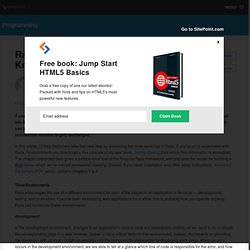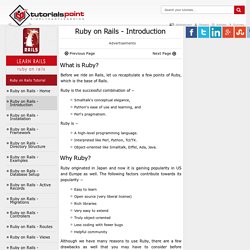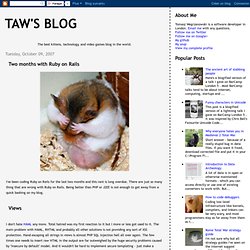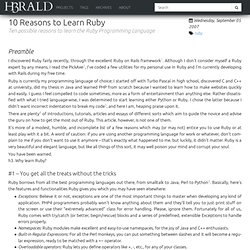

Activerecord. Sweepers. Ruby on Rails - ActionMailer Cheatsheet - Dizzy. A Simple Introduction To Ruby On Rails - Building A CRUD Application : OpenSource Release Feed. Rubyonrails. The ActiveRecord module is based on the concept of database abstraction.

As we mentioned in Chapter 1, database abstraction is a way of coding an application so that it isn't dependent upon any one database. Code that's specific to a particular database server is hidden safely in ActiveRecord, and invoked as needed. The result is that a Rails application is not bound to any specific database server software. Should you need to change the underlying database server at a later time, no changes to your application code should be required.
Examples of code that differs greatly between vendors, and which ActiveRecord abstracts, include: Before I can show you the magic of ActiveRecord in action, though, we need to do a little housekeeping. Tables are the containers within a database that store our data in a structured manner, and they're made up of rows and columns. An example of a table is shown in Figure 4.
So, let's create some tables to hold the stories we create. Naming Classes and Files. Ruby on Rails Introduction. What is Ruby?

Before we ride on Rails, let us recapitulate a few points of Ruby, which is the base of Rails. Zen and the Art of Ruby Programming. Rubyisms In Rails. Blog.freelancegator: Flexible parameters in ruby. Ruby Interfaces and Design By Contract. Two months with Ruby on Rails. I've been coding Ruby on Rails for the last two months and this rant is long overdue.

There are just so many thing that are wrong with Ruby on Rails. Being better than PHP or J2EE is not enough to get away from a quick bashing on my blog. Views I don't hate HAML any more. Total hatred was my first reaction to it but I more or less got used to it. Both HAML and RHTML are very powerful as templating languages. One more nice thing about ERB - it can be used pretty much everywhere, like in database.yml for switching database adapter depending on whether it's JRuby or matz's Ruby, or in SQL snippets meant for initializing database. Controllers Controllers are basically small bags of actions which actually do stuff.
Functional testing reuses controller objects without cleaning out their instance variables between requests. A good functional test would look something like that: but it's a long way to get anywhere near that point. form-test-helper is probably a good start. Models Routes Testing. 20+ Tools For RoR Development. Ruby on Rails is a popular web application framework for a lot of modern websites. We’ve gathered 20+ tools to help you with your Ruby on Rails coding – feel free to add more in the comments. Related: 20+ Flash Tools , 20+ PHP Tools , 20+ AJAX Tools , 20+ Java Tools ActiveScaffold.com – Ruby, Java, AJAX, all in one handy scaffold for better integration in your projects. DZone Snippets – A repository of thousands of code snippets for different programs, tons for RoR. Four Days On Rails – An attempt to teach you the basics of Rails in four days and get to where you can build basic apps in that time. Gardens Point Ruby.NET Compiler – A Ruby on Rails compiler for the .NET system.
HoboCentral.net – An extension package for Rails that allows for templates, working with AJAX, and rapid deployment. Instant Rails – Ruby, Rails, Apache and MySQL built in to one handy runtime for testing. Learn To Program – An online tutorial for people who aren’t that familiar with programming, let alone Ruby. 10 Reasons to Learn Ruby. Preamble I discovered Ruby fairly recently, through the excellent Ruby on Rails framework.

Although I don’t consider myself a Ruby expert by any means, I read the PickAxe, I’ve coded a few utilities for my personal use in Ruby and I’m currently developing with Rails during my free time. Ruby is currently my programming language of choice; I started off with Turbo Pascal in high school, discovered C and C++ at university, did my thesis in Java and learned PHP from scratch because I wanted to learn how to make websites quickly and easily. I guess I feel compelled to code sometimes, more as a form of entertainment than anything else. Rather dissatisfied with what I tried language-wise, I was determined to start learning either Python or Ruby. There are plenty of introductions, tutorials, articles and essays of different sorts which aim to guide the novice and advise the guru on how to get the most out of Ruby.
Ruby is elegant.